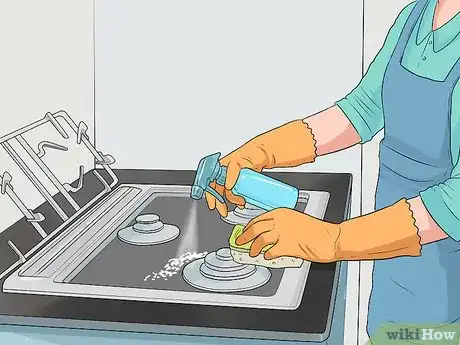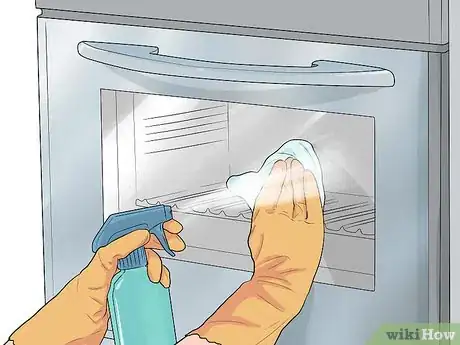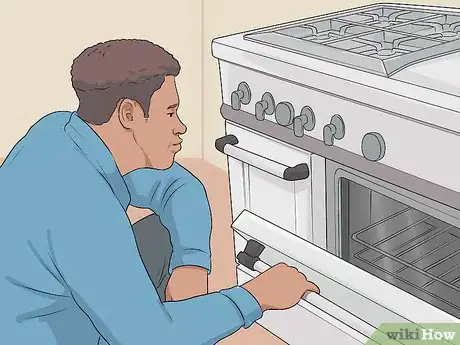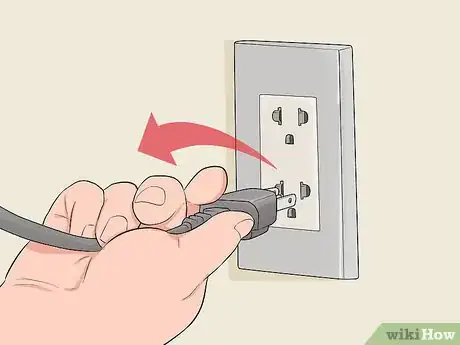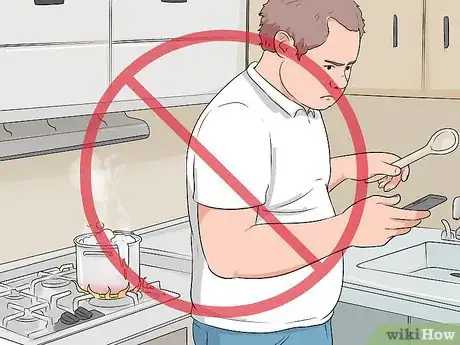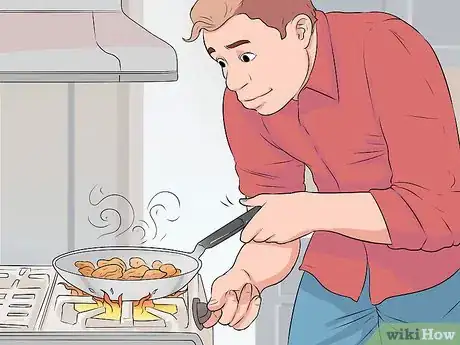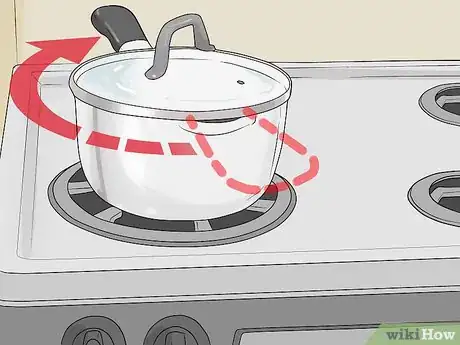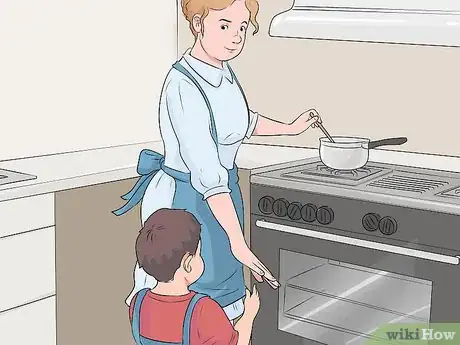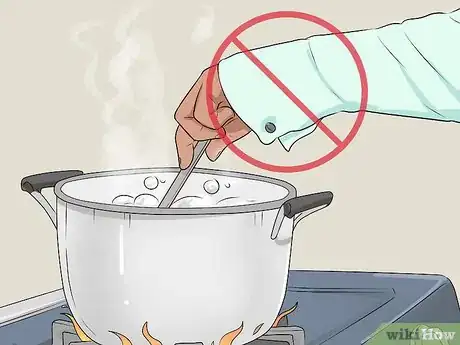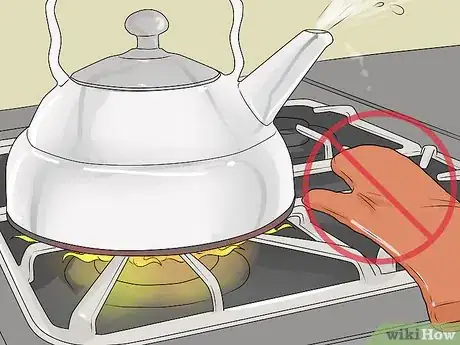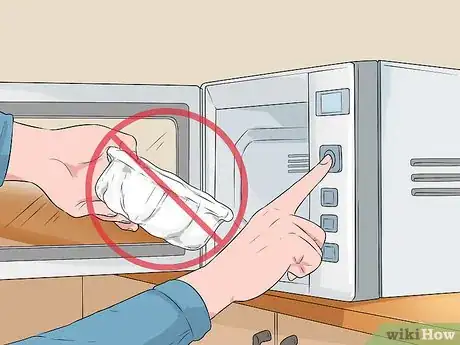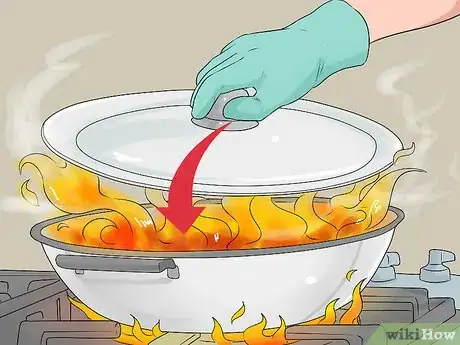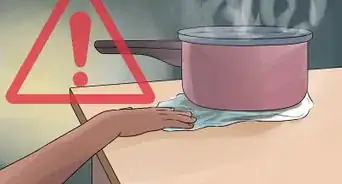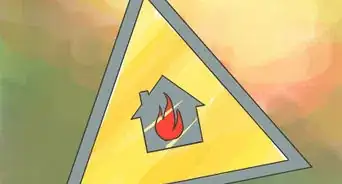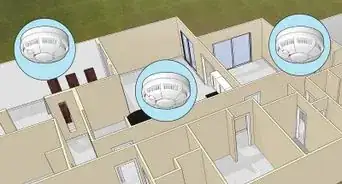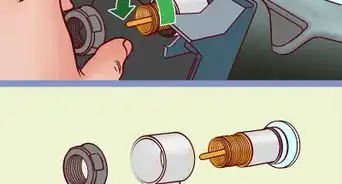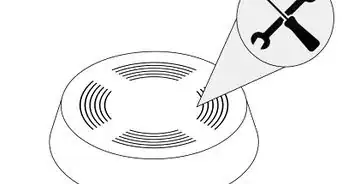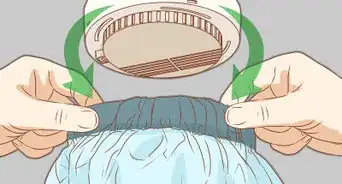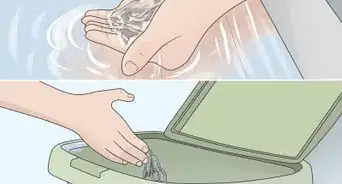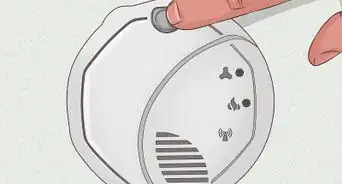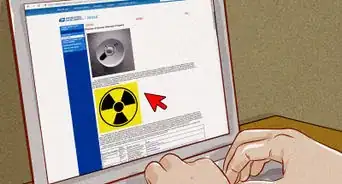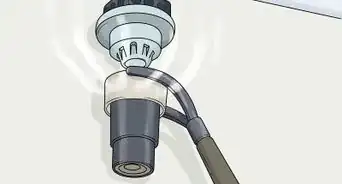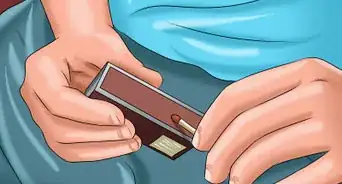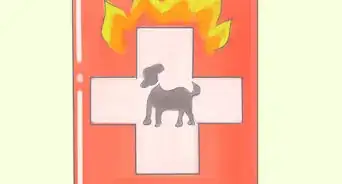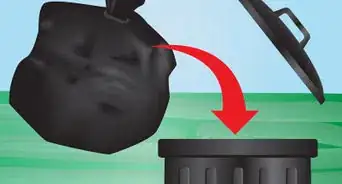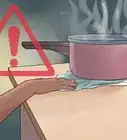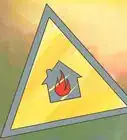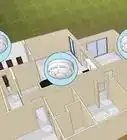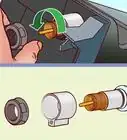This article was co-authored by wikiHow Staff. Our trained team of editors and researchers validate articles for accuracy and comprehensiveness. wikiHow's Content Management Team carefully monitors the work from our editorial staff to ensure that each article is backed by trusted research and meets our high quality standards.
There are 11 references cited in this article, which can be found at the bottom of the page.
This article has been viewed 46,273 times.
Learn more...
Cooking fires are the chief cause of home fires and injuries. Take precautions before and while you cook, such as cleaning your stovetop regularly, watching cooking food carefully, and moving any flammable objects away from the heat, to keep your home safe.
Steps
Keeping Your Kitchen Safe
-
1Keep the stovetop clean. Cooking on a regular basis leads to build-up from substances like leftover food and grease, which can easily catch fire. Wipe up spills and clean the area regularly with white vinegar or any surface cleaner.
- Before events when you know you'll be cooking a lot, such as parties and holidays, give the stovetop and oven a thorough cleaning to prevent any disasters that could ruin the day.
- Different types of stovetops require different deep-cleaning techniques. On a glass stovetop, use baking soda and a damp towel to soak and loosen the build-up before scraping it off.[1]
- For coil burners, remove and scrub the coils as well as the drip pans, or replace the drip pan liners.
- With gas burner cooktops, soak and scrub the grate in soapy water and use a vinegar and water mixture to scrub the cooktop. Use dish soap and a toothbrush to remove any stubborn grease build-up.[2]
-
2Keep appliances clean. Just as with the counters, check for grease or food build-up on your kitchen appliances, such as toasters, toaster ovens, electric griddles, and deep fryers. After many uses, appliances can develop build-up of flammable substances. Use an oil-based cleaner or a mixture of concentrated liquid dish soap and baking soda to scrub away the grease and food.[3]Advertisement
-
3Regularly inspect and service your appliances. Regular inspections of your appliances, whether you do it yourself or hire a professional, are also important to determine whether the items need servicing.
- Completing an inspection yourself may save you some money, but it is a lengthy and involved process, and if you are not an expert you may miss some important details.
- One quick inspection you can easily do yourself is to examine electrical cords occasionally to make sure they're not broken or frayed. If the cords are compromised, replace them.
-
4Check your smoke detectors. Make sure you have working smoke detectors on all floors of your home. You should have a smoke detector either inside or just outside of your kitchen. [4]
- Sometimes harmless incidents in the kitchen can set off the alarm, leading people to turn off the detector or remove it. If this happens, be sure to re-attach the detector and turn it back on to be prepared for any future incidents.[5]
-
5Unplug electric appliances when you’re not using them. Even when appliances are turned off, they still draw an electrical current. If the product is faulty or defective, leaving it plugged in can start an electrical fire.[6]
- Develop a habit of unplugging all appliances before you go to bed or leave for long trips.
- When you do use the appliances, plug them straight into the electrical outlet. Never use an extension cord or power strips, as these may overheat and start a fire.[7]
Practicing Safety While Cooking
-
1Don’t leave cooking food unattended. If you’re frying, broiling, boiling, or grilling any food, you must stay in the kitchen. If you need to leave, turn off the burner first. If you’re baking, broiling, or simmering food, set a timer and check it regularly.[8]
-
2Watch what you’re cooking. Many fires result from cooking at too-high temperatures. Keep an eye on your food and turn off the burner if you see smoke or grease boiling.[9]
-
3Turn pot and pan handles toward the back of the stove. Handles hanging over the edge of the stove are a major hazard as they are easily bumped, spilling the contents of the pot or pan and potentially causing burns or fire. Turning the handles ensures that people are less likely to bump or run into them.
-
4Keep children away from the stovetop. Make a rule that they must stay at least 3 feet (0.91 m) away from the cooking area, or any area where hot food and drink is being prepared.[10]
- If you have children, consider purchasing a stove guard, a barrier that prevents children from touching hot surfaces and protects from burns.[11]
-
5Don’t wear long, loose sleeves while cooking. Loose clothing can easily drag through food, touch open flame, or catch on pot handles. Roll up long sleeves or wear close-fit clothing to avoid this hazard.
- Before you start cooking, remove any other loose articles of clothing like scarves or ties.
- Long hair can cause a similar hazard. Be sure to tie up long hair to keep it out of the way when cooking.
-
6Keep any flammable objects away from the stovetop. It’s common to set a towel or potholder next to the stove and forget about it, but these objects can easily get too close to a heating element and catch fire. Any flammable objects, such as oven mitts, curtains, wooden utensils, and packaging, should be kept away from the stove and clear of danger. [12]
- If your curtains are close to the stovetop, consider using blinds instead.
-
7Don’t use metal objects in the microwave. Microwaving metal objects like aluminum foil or silverware can create sparks and set off a fire.
-
8Keep an oven mitt and metal pot lid nearby while cooking. Having these items on hand can help you to smother small stovetop fires. In the event of a fire, turn off the burner and then slide the lid over the fire and hold it there until it feels cool. If you lift the lid too early, the fire could start again.[13]
- With grease fires, remember to never fight the fire with water, as that will only make it spread. Use the lid technique to suffocate the fire instead.
Warnings
- Never throw water or use a fire extinguisher on a grease fire, as this will only spread the fire.⧼thumbs_response⧽
- Be especially careful when cooking with oil. Don’t overfill pots and pans with oil and always add food gently to avoid splattering.⧼thumbs_response⧽
- Let someone else do the cooking if you've been drinking alcohol, taking medication that could cause drowsiness, or are otherwise impaired.⧼thumbs_response⧽
- Follow the manufacturer's instructions when installing and using appliances such as stoves and ovens.⧼thumbs_response⧽
- Always check to make sure your stoves, ovens and other kitchen appliances have been tested by a reputable laboratory. In the United States, Canada, and some European and Asian countries, look for the Underwriters Laboratory seal on a product, which is marked with a "UL."⧼thumbs_response⧽
References
- ↑ http://www.diynetwork.com/how-to/maintenance-and-repair/cleaning/how-to-clean-a-glass-top-stove
- ↑ http://www.apartmenttherapy.com/how-to-clean-and-maintain-a-gas-stove-apartment-therapy-tutorials-215396
- ↑ http://safety.lovetoknow.com/Kitchen_Fire_Prevention
- ↑ http://www.dummies.com/home-garden/home-security/where-to-install-a-smoke-detector/
- ↑ http://www.dummies.com/home-garden/home-security/where-to-install-a-smoke-detector/
- ↑ https://www.nachi.org/fire-safety-home.htm
- ↑ https://www.travelers.com/resources/home/fire-safety/kitchen-fire-safety.aspx
- ↑ http://www.redcross.org/news/article/Avoid-Kitchen-Fires-Use-Red-Cross-Tips
- ↑ https://www.usfa.fema.gov/downloads/pdf/publications/kitchen_fires_flyer.pdf
- ↑ http://www.redcross.org/news/article/Avoid-Kitchen-Fires-Use-Red-Cross-Tips
- ↑ http://www.fire.nsw.gov.au/page.php?id=83
- ↑ https://www.nfpa.org/Public-Education/Fire-causes-and-risks/Top-fire-causes/Cooking
- ↑ https://www.thekitchn.com/kitchen-safety-how-to-put-out-138233
- ↑ http://www.redcross.org/news/article/Avoid-Kitchen-Fires-Use-Red-Cross-Tips
About This Article
To prevent a kitchen fire, keep your stovetop and appliances clear of old food and grease so they don't catch fire. You should also unplug electrical appliances in your kitchen when you're not using them since plugged-in faulty appliances can cause a fire. Whenever you're cooking in the kitchen, avoid leaving food unattended, and keep flammable objects away from the stovetop. Also, never put metal objects in the microwave. To learn how to avoid burns in a kitchen, scroll down!
